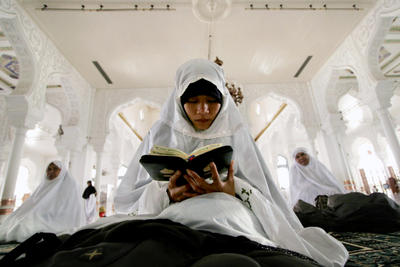But Islam in Indonesia has many more benign faces. These usually play a much more important role in the lives of most Indonesians than do the hardliners, who dominate media coverage.
Ibu (Mrs) Suciwati, an Indonesian mother living in West Java, experienced firsthand the often-overlooked positive aspects of Islam in Indonesia when she made a reluctant appearance in Indonesia’s Islamic courts last year. Known as the Religious Courts, their main work is family law for Muslims, which constitutes more than 90 per cent of cases.
Ibu Suciwati’s parents arranged her marriage when she was 14 years old, two years below the age at which girls can legally marry in Indonesia. This meant her marriage was not registered and her three children now lack birth certificates. This is not unusual. UNICEF says as many as 60 per cent of Indonesian children under five are in the same predicament.
After five years of marriage Ibu Suciwati’s husband left to work on another island and never returned. She has since had no contact and even learnt that he remarried. Naturally, she has long wanted a formal divorce to evidence her situation as a female head of household. But, earning less than US0.70 a day (the Indonesian poverty line), even a trip to the local town where the court sits would cost her more than two weeks’ income.
Then Religious Court staff advised that her case could be heard by a circuit court (sidang keliling) when judges travelled to a village near hers, thus slashing her travel costs. Better still, the judges would waive court costs because of her poverty. When Ibu Suciwati finally appeared before the court in a village office a few kilometres from her home, the judges first formalised her earlier non-legal marriage and then issued the divorce certificate she needed to officially end it. As a result, Ibu Suciwati’s three children now have birth certificates showing both parents’ names and, importantly, showing they were born within wedlock — thus allowing them to enrol for national school examinations and avoid social discrimination.
In Ibu Suciwati’s case, the key to her family’s hopes of breaking out of the poverty trap is her ability to access the Religious Courts to formalise her legal status and, therefore, that of her children. This was only possible thanks to innovative circuit courts and their fee waiver programs, supported by the Australian government’s aid agency (AusAID) and the Family Court of Australia. The government of Indonesia has since approved a significant budget increase for these initiatives. Now the troubled secular courts, notorious for their resistance to change but anxious not be left behind by Religious Courts, are looking to adopt such programs as well. The Islamic judiciary have thus become leaders of court reform in Indonesia.
The result has been a 10-fold increase in access to the Religious Courts for the poor. Contrary to common assumptions about Islamic courts, nearly two-thirds of applicants in the Religious Courts in Indonesia are women. Even more counter-intuitively, the vast majority of women win their cases, most of which are decided procedurally on the basis of codified state versions of sharia. These confer on women and men alike similar rights to what is virtually ‘divorce on demand’. One ground available to both parties is simply ‘absence of harmony’ in the marriage.
As in Ibu Suciwati’s case, Indonesian women’s ability to document their role as female heads of household gives vital access to the Indonesian government’s social welfare programs. These include cash transfers, free health treatment, subsidised rice and enrolment of children at state schools — benefits that often determine whether a family survives at all. The new initiatives to waive fees for the very poor and send courts out to remote villages, once cut off from these programs, will make an important contribution to breaking long-standing poverty cycles.
It is often forgotten that Indonesia’s remarkable transition to democracy after Soeharto’s fall in 1998 was driven in part by mainstream Muslim organisations. The work of the Religious Courts over the last five years is a fresh example of the potential of Islamic institutions in Indonesia to act as agents for reform, development and social justice, despite the contrary ambitions of the hardliners. It shows a willingness to engage with government, civil society and non-Muslim foreign institutions to achieve objectives that both judges and litigants in these courts see as ‘real Islam’ in action.
Professor Tim Lindsey is Director of the Asian Law Centre and the Centre for Islamic Law and Society, both in the Law School at the University of Melbourne.
Cate Sumner is a consultant working on access to justice and judicial reform programs in Indonesia.
They are co-authors of Courting Reform: Indonesia’s Islamic Courts and Justice for the Poor, recently released by the Lowy Institute for International Policy in Sydney.

